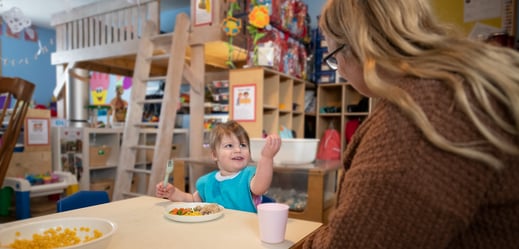
We recently hosted the Baby Talk: Building Relationships with Infants and Toddlers webinar with Becky Danis, Responsive Solutions Developer at Teachstone, and Monica Pujol-Nassif, Senior CLASS® Specialist. In this webinar, you’ll learn about the importance of brain development and the optimal ways for early childhood educators to interact with infants and toddlers in their care.
Early Development
Most brain development happens before the age of eight, with the interactions and experiences during a child’s first three years serving as a foundation for the development of core skills. During these early years, children are most receptive to learning new things through the modeling of behaviors and language.
A child’s genetic mapping, nutritional influences, and environment are essential components to healthy development. A strong attachment to caregivers and early childhood educators is also crucial during this rapid stage of growth.
The Early Childhood Educator’s Role
Children acquire core skills between birth and elementary school that influence how they communicate with others, regulate themselves, and think. Children who develop core social, emotional, and cognitive abilities early in life show stronger early literacy and math skills, which translates into more successful pursuits later in life.
Meaningful interactions between early childhood educators and children serve as building blocks to strengthen these connections. You may not realize it, but the interactions you have with young children leave imprints on their lives.
During the live event, our hosts asked attendees to recall their favorite teachers. So many of you chatted in your teachers by name even after so many years, demonstrating the powerful and lasting influence educators have.
Promoting Co-Regulation
Children need adults to help them identify and regulate their emotions. This is accomplished through co-regulation, which consists of warm, responsive, and consistent interactions by caregivers and educators. These interactions help children learn to express and modulate their thoughts and feelings, which ultimately leads to self-regulation.
In your work with children, you are teaching them how to interact with others while also helping them understand how to manage themselves. Through the modeling of behavior and communication, children learn how to empathize as well as control their thoughts and actions. By imitating your actions and copying your words, infants and toddlers become more expressive. A study by Murray, et al, notes that such support, coaching, and modeling teach children how to “understand, express, and modulate their thoughts, feelings, and behaviors.”
Providing an environment that is warm and predictable helps to promote feelings of safety and security in children. Demonstrating joy in your actions further increases a child’s engagement and exploration, providing more opportunities for learning. To demonstrate this principle in action, Becky shared a video of an early childhood educator interacting with young children in a way that naturally promoted their need to imitate and interact.
Promoting Reciprocal Activities
Warm greetings, communication while diapering, and words of encouragement are just a few of the ways in which early childhood educators promote reciprocal activities during the formative early years.
The following behaviors are additional ways in which you can promote reciprocal interactions:
- Providing verbal or physical affection and affirmation
- Engaging in back-and-forth verbal exchanges
- Playing together
- Challenging a child’s current skills
Positive interactions, through which children share joy with their caregivers, keep children engaged and encourage them to seek out and try new things. These actions lead to deeper engagement with their environment and more meaningful interactions with those around them. They also promote increased creativity and exploration, which are the building blocks for higher-order thinking.
Incorporating Families
As part of a child’s development, it is important to build a collaborative role with families and communicate consistently. This includes sharing information and ideas about the child’s development and scheduling opportunities to share ways in which the family can facilitate their growth. By emphasizing the role of family and providing suggestions for developmentally appropriate practices at home, you can ensure adequate stimulation and support even when the child is not in your care.
Using Brain-Building Strategies
Children learn by watching and imitating those who take care of them. From facial expressions to repeating words, your interactions give children a sense of how to interact with others and interpret the world around them.
When caring for infants and young children, consider including these brain-building strategies:
- Hold an infant in your arms or sit close enough to a child to engage in eye-to-eye contact during feeding.
- Communicate your intent when diapering a child. Allow the child to help if capable.
- Choose books children can relate to and encourage participation and movement during storytelling. Verbal toddlers may surprise you by telling you the story using pictures!
- Promote exploration with open-ended materials, such as scarves, crayons, and baskets. Be sure to allow adequate time for exploration.
Take-Aways
By focusing on how you relate to children and deliver information, you can both engage and inspire their growth. Creating routines and providing impactful interactions help infants and toddlers feel safe and comfortable exploring their environments. Children who learn to relate, regulate, and communicate early in life demonstrate early literacy and math skills and tend to make the most of their learning opportunities in the classroom.
Early childhood educators set the stage for infants and toddlers to learn from their environment and support the development of self-regulation. For more tips on building stronger relationships with the infants and toddlers in your care, watch the webinar recording here.

